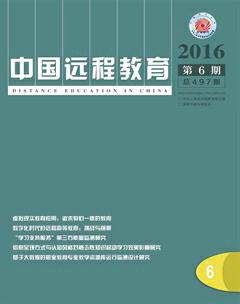英文摘要
Virtual reality in education: a mind-body integrated approach
——The 2016 smart learning and virtual reality
in education week, BNU
Zhizhen Zhang
As the year of virtual reality (VR) progresses, educational technology practitioners and researchers pay closer and closer attention to the rapid development of VR technologies and their application in education. The 2016 Smart Learning and Virtual Reality in Education Week of Beijing Normal University showcased the current development of VR technologies and VR industry. Cases of VR application in Education were analyzed from the perspectives of human-machine relationship, educational media, embodied cognition and experiential learning. The main educational functions of VR, namely experiencing, inquiry, drilling, behavior-modification, communication, making and gaming were presented and discussed along with the cases. Finally, suggestions for various stake-holders were put forward on promoting VR application in education.
Keywords: virtual reality; augmented reality; embodied cognition; application in education; educational media; experiential learning; educational functions
Distance higher education in the digital era: challenges and prospects
Sarah Guri-Rosenblit
Higher education institutions offering currently studies through distance teaching methods vary enormously in how they were initiated, the clienteles they aim to serve, how they are funded, and the kinds of programs they offer. The article examines the major challenges that different-type distance higher education institutions face in the digital era. The challenges relate to the blurring boundaries between distance and campus universities; the change of technological and instructional infrastructures; the move from national systems to a global landscape; the urge to find appropriate parties for collaboration in the academic and corporate worlds; the search for quality assurance mechanisms; and the digital divide between developing and developed countries, and between poor and rich. The article concludes with portraying the leading future prospects for distance higher education institutions.
Keywords: distance education; open university; distance teaching university; e-learning; digital technologies; digital divide; quality assurance
Third party quality monitoring of learner support service
Xun Xie, Qinhua Zheng and Li Chen
Learner support service is a significant factor to be considered in evaluation of distance education quality. With the development and improvement in distance education theories and practices, abundant well-wrought studies and implementations have been available in the field of learner support services. Based on quality standards on learner support services both at home and abroad, and with Chinas reality in mind, this study set out to develop “the learner support service quality standard and index (LSSQSI)” from the two dimensions of academic and non-academic support to suit the needs of distance education in China, covering eight aspects: tutoring and Q&A, homework feedback, interaction channels, skills training, technological support, information service, scholarships and complaint mechanism. The study aims to monitor learner support service quality, using open data, in the online education colleges of campus-based universities and the Open University system, exploring the feasibility of third party quality monitoring. The result shows that both the online education colleges and the Open University system lay great emphasis on learner support, providing diversified modes of learner support services to students in advanced technologies. Nevertheless, there exists a lack of systematic planning and overall design, and corresponding service standards on the whole.
Keywords: learner support service; distance education; quality monitoring; academic support; non-academic support
The influence of information presentation modes and cognitive styles
on mobile learning efficiency of conceptual knowledge
Ting Lu and Xianmin Yang
The design and development of mobile learning resources has always been top on the research agenda of educational researchers, but research into learners intrinsic learning needs remains a gap in the literature. This study explores how three different presentation modes (text, text and graphics, video) of conceptual knowledge influence mobile learning efficiency in relation to different cognitive styles (field dependent and field independent) of learners, aiming to provide guidelines for the designers of mobile learning resources. The result shows that the video mode can best facilitate learning conceptual knowledge in the mobile learning environment, and the field independent mobile learners can achieve better efficiency than the field dependent ones when engaged in independent mobile learning of conceptual knowledge.
Keywords: conceptual knowledge; cognitive style; mobile learning; information presentation mode
Vocational education teaching resources libraries: operation
monitoring design based on big data
Shunping Wei, Bo Wang and Xiaoju Hou
Vocational education teaching resources libraries are one of the important projects to deepen vocational education reform in China, hence attracting attention from education authorities at all levels. The MOE has been monitoring the quality of the resources, effectiveness of their usage and updates of the resources. Informed by the current theories and methods of big data and learning analytics, this study examined the operation monitoring design of vocational education teaching resources libraries based on big data, including monitoring mode construction, monitoring content framework design, monitoring tools development, monitoring report generation and publication. This research can serve as a powerful support for vocational education teaching resources development, and contribute to achieving the vocational education reform goals.
Keywords: higher vocational education; teaching resources library; operation monitoring; big data; learning analytics

